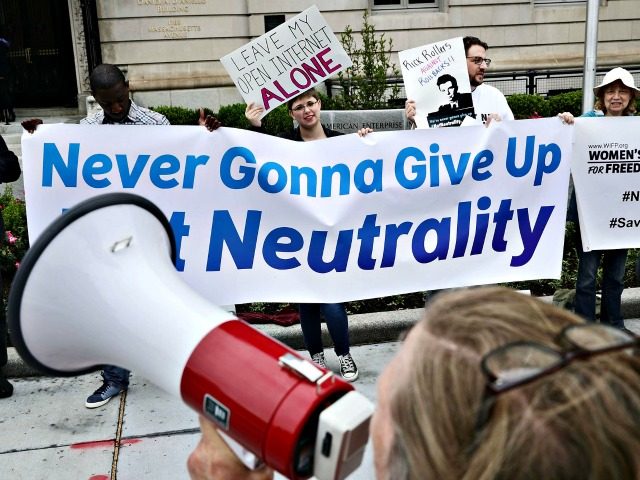In my previous op-ed, I argued that big tech companies like Google, Facebook, Twitter, and YouTube and services like GoDaddy and Cloudflare are currently a greater threat to a free and open internet than ISPs. The FCC agrees.
In their fact-sheet on Net Neutrality reform, the FCC notes that “recent evidence suggests that hosting services, social media platforms, edge providers, and other providers of virtual Internet infrastructure are more likely to block content on viewpoint grounds.”
From the fact-sheet:
We emphasize once again that we do not support blocking lawful content, consistent with long-standing Commission policy. The potential consequences of blocking or throttling lawful content on the Internet ecosystem are well-documented in the record and in Commission precedent. Stakeholders from across the Internet ecosystem oppose the blocking and throttling of lawful content, including ISPs, public interest groups, edge providers, other content producers, network equipment manufacturers, and other businesses and individuals who use the Internet. This consensus is among the reasons that there is scant evidence that end users, under different legal frameworks, have been prevented by blocking or throttling from accessing the content of their choosing. It also is among the reasons why providers have voluntarily abided by no blocking practices even during periods where they were not legally required to do so. As to free expression in particular, we note that none of the actual incidents discussed in the Title II Order squarely implicated free speech. If anything, recent evidence suggests that hosting services, social media platforms, edge providers, and other providers of virtual Internet infrastructure are more likely to block content on viewpoint grounds.
In their footnotes, the FCC sites a number of incidents in which major tech companies blocked lawful content, including the effective removal of the Daily Stormer from the internet and the banning of free speech platform Gab from the Apple and Google Play stores.
See, e.g., Cloudflare, Why We Terminated Daily Stormer (Aug. 16, 2017),https://blog.cloudflare.com/why-weterminated-daily-stormer/ (explaining why Cloudflare, which provides reverse proxy, CDN, and DNS services, ceased providing these services to the neo-Nazi Daily Stormer website: “[W]e’ve felt angry at these hateful people for a long time but . . . remained content neutral as a network. We could not remain neutral after these claims of secret support by Cloudflare.”); Timothy B. Lee, Tech companies declare war on hate speech—and conservatives are worried, ArsTechnica (Aug. 31, 2017), https://arstechnica.com/tech-policy/2017/08/tech-companies-arecracking-down-on-hate-speech/ (“[U]sers across the political spectrum have long criticized technology companies for their seemingly arbitrary and non-transparent processes for moderating content on their platforms.”); Jeremy Malcolm, Cindy Cohn, and Danny O’Brien, Fighting Neo-Nazis and the Future of Free Expression, Electronic Frontier Foundation (Aug. 17, 2017), https://www.eff.org/deeplinks/2017/08/fighting-neo-nazis-future-freeexpression (“Because Internet intermediaries, especially those with few competitors, control so much online speech, the consequences of their decisions have far-reaching impacts on speech around the world.”); Aaron Renn, How Apple and Google are censoring the mobile Web, New York Post (Aug. 21, 2017), https://nypost.com/2017/08/21/how-apple-and-google-are-censoring-the-mobile-web (“What few people yet understand is that Google and Apple have used their duopoly status to revoke the First Amendment on mobile phones.”); Kevin Robillard, Twitter pulls Blackburn Senate ad deemed ‘inflammatory’, Politico (Oct. 9, 2017), https://www.politico.com/story/2017/10/09/marsha-blackburn-twitter-ad-243607 (“Twitter is barring a top Republican Senate candidate from advertising her campaign launch video on the service because a line about her efforts to investigate Planned Parenthood was deemed “inflammatory.”); Hamza Shaban, Gab is suing Google for allegedly violating antitrust laws, Washington Post (Sept. 15, 2017) https://www.washingtonpost.com/news/theswitch/wp/2017/09/15/gab-is-suing-google-for-allegedly-violating-antitrust-laws/?utm_term=.fa40f5467e2d (“Google banned the social media platform from the Google Play Store last month, citing violations of Google’s hate speech policies.”).
You can follow Allum Bokhari on Twitter, Gab.ai, and add him on Facebook. Email tips and suggestions to abokhari@breitbart.com.

COMMENTS
Please let us know if you're having issues with commenting.